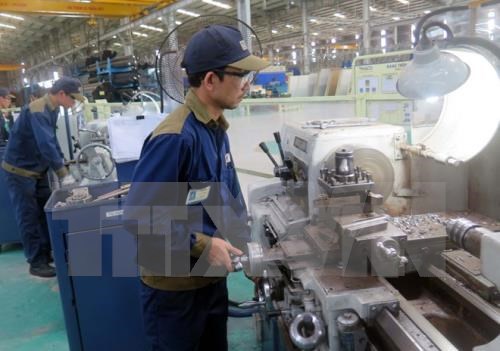Investors remain optimistic about Vietnam’s economy
Domestic and foreign investors are still keen on the Vietnamese market and have positive outlook about the country’s economy, according to a survey conducted by Grant Thornton Vietnam.
 Workers at an automobile manufacturing factory (Illustrative image. Source: VNA)
Workers at an automobile manufacturing factory (Illustrative image. Source: VNA)While there is a slight decrease of 6 percent from the previous survey, still 55 percent of respondents expressed their optimism about Vietnam’s economy.
Besides, 69 percent of businesses evaluated Vietnam as an attractive destination for investment activities and 91 percent of enterprises agreed on the positive growth prospect of Vietnam’s economy in the next 12 months.
There are a lot of factors to help Vietnam attract investment.
Firstly, the establishment of the ASEAN common market has also expanded the Vietnamese market.
Additionally, the foreign investment flow shifted from China to other Southeast Asian countries also benefits Vietnam.
Furthermore, a series of free trade pacts between Vietnam and foreign partners like the Republic of Korea, Japan, and the EU as well as the Trans-Pacific Partnership (TPP) agreement has made Vietnam become a bright spot in the regional investment map.
Vietnam is also attractive because of its abundant source of labour, low operational cost, diverse population structure and stable political environment.
The Government’s commitments to intensifying the fight against corruption and red tape, and to protecting the legitimate rights and interests of businesses to create a healthy investment environment is another reason for investors’ confidence.
The promulgation of Resolution No.35/2016/NQ-CP to support businesses, especially small- and medium-sized enterprises (SMEs) in 2016-2020, indicates that the Government is working to reinforce trust of investors to fuel economic growth.
Investors, however, are still concerned about corruption and bureaucracy as major barriers to Vietnam’s investment attraction. In addition, the slow restructuring of State-run companies, high rate of public debt, State budget deficit, and SMEs low competitiveness pose serious problems for Vietnam’s economic prospects.
State-owned enterprises become less attractive for investors, when in the previous survey, 46 percent of respondents selected State equitised firms as attractive destinations, but this time the rate was reduced to only 29 percent.
According to Grant Thornton Vietnam, global private investment foundations are showing special interest in the Southeast Asian country.
In early 2016, Warburg Pincus announced its plan to make inroads into the market. Meanwhile, Standard Chartered poured 28 million USD in the field of consumption and Navis injected money in the healthcare sector.
Retail, food-beverages, health and education continue to receive much attention from both domestic and foreign investors.-VNA













